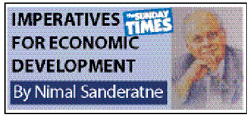Columns
Challenging opportunity for sustainable economic development
View(s):On the eve of the 67th anniversary of independence there is an air of hope and much expectation of economic development within a democratic polity. The country has regained its democratic freedoms and the first steps have been taken by President Maithripala Sirisena and Prime Minister Ranil Wickremesinghe towards good governance.
 Good governance is a strong foundation to achieve economic growth. Law and order, the rule of law and national integration are prerequisites for economic development. However, the enormity of the challenges requires bold decisions to reform the economy to achieve sustained high economic growth.
Good governance is a strong foundation to achieve economic growth. Law and order, the rule of law and national integration are prerequisites for economic development. However, the enormity of the challenges requires bold decisions to reform the economy to achieve sustained high economic growth.
Good economics is often bad politics in the short term but good economics is good politics in the long run.
Economic challenges facing the country are formidable. In fact they may be more formidable than the economic facts and figures that are known. One of the foremost tasks of the Government and the Central Bank is to get an accurate assessment about the economy. This is particularly relevant in the case of the foreign debt and public finances. A well-defined baseline shorn of the glitter given to data by the Central Bank in the recent past is needed.
Foreign debt
For instance, what are the precise figures of the Government’s foreign borrowing, the terms and conditions of borrowing and repayment commitments? It is not only the Government’s foreign borrowing that matter but the recent proxy borrowing by banks for government expenditure and foreign borrowing of private firms that are contingent liabilities on the foreign exchange reserves of the country. Private debt easily becomes sovereign debt if a crisis occurs. Therefore, the actual foreign debt may well be much higher than what is known.
 Even the known official figure of foreign debt of about US$ 45 billion is far too high as the servicing of the foreign debt requires about one fourth of export earnings and consequently strains the balance of payments. The former regime did not consider this massive foreign debt and its large servicing cost a burden as it resorted to further borrowing to repay debt.
Even the known official figure of foreign debt of about US$ 45 billion is far too high as the servicing of the foreign debt requires about one fourth of export earnings and consequently strains the balance of payments. The former regime did not consider this massive foreign debt and its large servicing cost a burden as it resorted to further borrowing to repay debt.
The Government must refrain from further large scale borrowing or at least minimise new debt. On the other hand, it should redeem some of the debt by the use of balance of payments surpluses. There is also the need to substitute higher interest loans by lower interest rate borrowing. The Government intends to issue a sovereign bond of US$ 1 billion this month rather than the originally intended US$ 1.5 billion. This should be used to reduce debt servicing costs as the current international interest rates are low. The careful management of the foreign debt is essential.
Trade deficit
Reducing the trade deficit is vital for achieving a significant balance of payments surplus. This could be achieved by reducing aggregate demand and improving relative prices such that export incentives are not lower than incentives to produce import substitutes. Government imports of investment and intermediate imports that are not on the basis of raising efficiency or social welfare should be curtailed. Increased government imports of vehicles, machinery and goods for infrastructure projects, as well as haphazard reduction in import tariffs are reasons for recent large trade deficits.
The reduction in international crude oil prices should reduce the oil bill. However, tea exports may face difficulties owing to lower oil prices reducing incomes and thereby the demand for tea by oil exporting Middle Eastern countries and Russia that are the main markets for tea. The last quarter has also seen a drop in demand for garments exports. While exporting more should be the long term means of reducing the trade deficit, reducing unproductive imports is the immediate way.
Fiscal deficit
The most deep-seated problem is the recurring large fiscal deficits that have led to an increase in public debt, increased foreign debt, high debt servicing costs and distortion of public expenditure. The previous regime, though acknowledging debt to be high, was complacent as the debt to GDP ratio was declining. This was owing to some public debt being passed on to banks and the increasing public debt being a lower proportion of a high GDP growth.
The severity of the problem is clear as nearly all of government revenue was needed to service the debt in recent years. In 2013 the entire government revenue was inadequate to service the debt. This means that the Government had to borrow to meet the entirety of its recurrent and capital expenditure. Consequently the public debt and debt servicing costs increased.
This vicious cycle of high debt increases debt servicing costs which in turn increases the debt — and debt servicing costs must be broken by a two pronged strategy of increasing government revenue and decreasing irresponsible expenditure.
GDP growth
Much of the recent economic achievement is based on the high average annual GDP growth of 7.5 per cent in the post-war period. This growth rate as denominator of public debt and foreign debt gives declining ratios. However, the GDP growth statistic is bloated and misleading, not only due to likely massaging of figures but as growth was mostly due to large infrastructure construction expenditure, increased expenditure on defence after the war, large scale recruitment to the public services and wasteful expenditure that adds to the GDP. Corruption, wasteful and unproductive expenditure increases GDP.
Concluding reflections
The first steps taken by the new regime especially to ensure good governance would have a beneficial impact on the economy. Whether this foundation in the first 100 days would continue after a parliamentary election later this year is uncertain given the country’s recent unprincipled electoral party politics.
A stable government with a clear cut agenda willing to take bold and unpopular good decisions is the need of the hour. Will the new government undertake the needed economic reforms that may be politically unpalatable? Will this opportunity be frittered away due to an inability to take the right decisions to undertake economic reforms? Will the government have the political resolve to take the correct economic decisions that may be politically unpalatable? The 67 years after independence have been strewn with missed opportunities. Let us not miss this timely opportunity.

